
Delayed implementation of electronic medical records
People's Physician, Associate Professor, Doctor Tran Quy Tuong, Chairman of the Medical Informatics Association, former Director of the Department of Information Technology ( Ministry of Health ) said that in the context of strong digital transformation in the health sector, the implementation of electronic medical records (EMR) to replace paper records is an inevitable and urgent requirement.
EMR brings many outstanding benefits, especially for patients: no need to carry a lot of documents when going to the doctor, saving waiting time thanks to the quick processing process, medical history information, test results and diagnostic images are stored centrally, accurately and securely.
Thanks to this, doctors can fully grasp health status, limit duplicate testing, reduce costs and effort for patients. Electronic records also ensure continuity of care, allowing patients to access services at many medical facilities without worrying about losing information. At the same time, EMR contributes to improving safety in treatment by limiting errors in prescription and medication use and supporting doctors to make more accurate decisions.
In particular, EMR also helps patients proactively monitor their health through digital applications, which is an important basis for establishing electronic health records, thereby increasing satisfaction and trust in medical services.
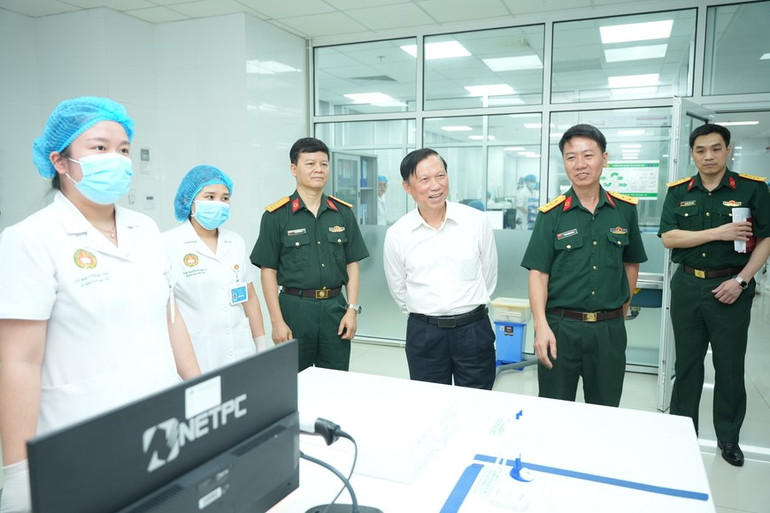
From a management perspective, the implementation of EMR provides a large, “sufficient-clean-alive” source of data on people’s health status and medical examination and treatment activities of medical facilities for the national database. This is an important basis for the health sector to carry out modern administration, policy making and improve the quality of people’s health care.
However, after more than 7 years since the Ministry of Health issued Circular No. 46/2018/TT-BYT dated December 28, 2018 regulating electronic medical records, and nearly 7 months of implementing Directive No. 07/CT-TTg dated March 14, 2025 of the Prime Minister requiring 100% of hospitals nationwide to deploy electronic medical records (EMR) before September 30, 2025, the implementation has achieved initial results.
According to the Ministry of Health's electronic information portal (published at: https://benhandientu.moh.gov.vn), as of October 3, 2025, 991 hospitals have announced the implementation of electronic medical records.
Of these, 881 hospitals, accounting for 53.6% (881/1,645 hospitals nationwide), announced the implementation of EMR before October 2, 2025 and are considered to have achieved progress according to the Prime Minister's direction. However, 110 hospitals announced the implementation after October 2, 2025 (some even as late as June 2026), which means they did not complete the project on time as required.
Among 881 hospitals that have achieved progress in implementing EMR, there are 27/45 hospitals under the Ministry of Health (including 5 University of Medicine hospitals), reaching 60.0%; 329/492 provincial hospitals, reaching 66.9%; 339/684 district hospitals, reaching 49.6%; 147/384 private hospitals, reaching 38.2%; 30 military hospitals, 3 police hospitals and 6 hospitals under other ministries and branches.
Up to now, some localities have deployed EMR in all hospitals, such as the former Phu Tho province, Quang Ninh province, An Giang province, Bac Ninh province (including the former Bac Ninh and the former Bac Giang), the former Thai Nguyen province, Vinh Long province, Hanoi city, ... .
The top 10 hospitals that deployed EMR the earliest are: Hai Phong International General Hospital, An Giang Regional General Hospital, Phu Tho Provincial General Hospital, Vinh City General Hospital (Nghe An), Quang Ninh Obstetrics and Pediatrics Hospital, Quang Ninh Provincial General Hospital, Bai Chay General Hospital (Quang Ninh), Long Khanh General Hospital (Dong Nai), Agricultural General Hospital, Quang Khoi General Hospital (Nghe An).
“Despite many efforts, the progress of EMR implementation nationwide has not met the requirements and has not completed the goal of “finishing” on time as assigned by the Prime Minister,” Mr. Tuong shared.
Need to continue to remove difficulties for medical facilities
When storing electronic medical records instead of paper medical records, hospitals need to build a strong enough information technology infrastructure, and storage devices must have enough capacity to store electronic medical records to meet the medical record storage time prescribed by law.
However, the application of electronic medical records (EMR) in Vietnam still faces many challenges. According to some medical facilities that have not "reached the finish line" on time, the implementation of EMR in public hospitals requires a large initial investment, while the resources of hospitals are limited. Currently, there are no specific guidelines on financial mechanisms for the application of health information technology in general and the implementation of EMR in particular.
“The cost of medical services has not yet taken into account the cost of information technology, so hospitals mainly have to use their own development investment fund, affecting other essential activities,” said one person.
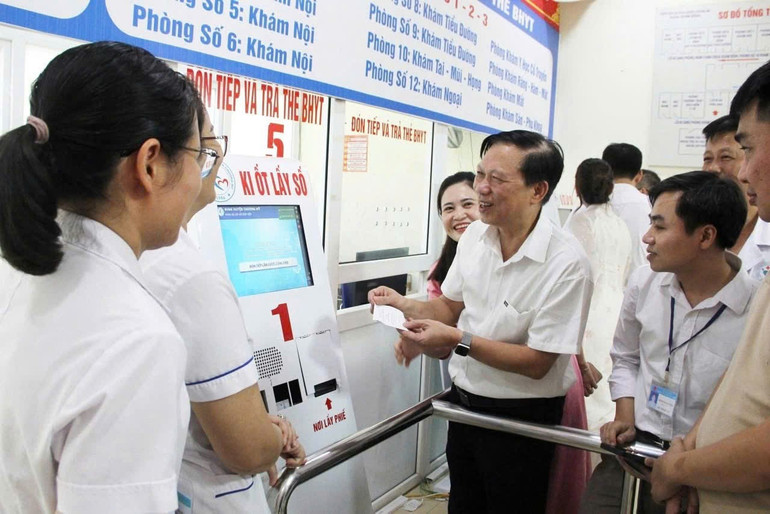
The information technology platform and infrastructure of the Vietnamese healthcare sector is still weak and lacking, while this is a prerequisite for EMR implementation. This limitation causes a large total cost and requires the mobilization of many resources to be able to balance. Therefore, it is necessary to seriously consider the issue of "readiness" in EMR implementation, including policy, technical infrastructure, human resources and finance.
To overcome these difficulties, Mr. Tuong said that the Ministry of Health needs to continue to pay more attention and direct more closely the work of digital transformation of healthcare in general and the implementation of EMR in particular. Departments and agencies must proactively advise and propose policies and solutions, while simultaneously deploying platforms, application systems and specialized databases in a synchronous manner, creating motivation and "readiness" for the widespread application of EMR.
The Ministry of Health needs to develop, supplement and perfect mechanisms, policies, legal documents, as well as professional guidance documents to support hospitals in deploying EMR in a unified, synchronous and effective manner; promptly issue regulations on prices of medical examination and treatment services according to Article 110 of the Law on Medical Examination and Treatment 2023 (effective from January 1, 2024), in which information technology costs must be calculated correctly and fully. This is a key condition for medical examination and treatment facilities to have funding sources to invest, maintain and develop the EMR system.
EMR not only optimizes the medical examination and treatment process, improves the quality, efficiency and safety of medical services, but also significantly improves the experience of patients and medical staff.
“The health sector needs to coordinate more closely with Party committees and local authorities at all levels, come up with drastic and specific solutions, especially for the remaining 46.4% of hospitals that must urgently deploy EMR, ensuring the completion of the goal of digital transformation of health care according to the direction of the Government. With the drastic direction of the Government and the Ministry of Health, the close coordination of ministries, branches, localities and the efforts of the entire health sector, the goal of successfully deploying electronic medical records nationwide is completely feasible,” Mr. Tuong affirmed.
Source: https://nhandan.vn/moi-co-hon-50-co-so-y-te-trien-khai-benh-an-dien-tu-post912980.html



![[Photo] Prime Minister Pham Minh Chinh launched a peak emulation campaign to achieve achievements in celebration of the 14th National Party Congress](https://vphoto.vietnam.vn/thumb/1200x675/vietnam/resource/IMAGE/2025/10/5/8869ec5cdbc740f58fbf2ae73f065076)




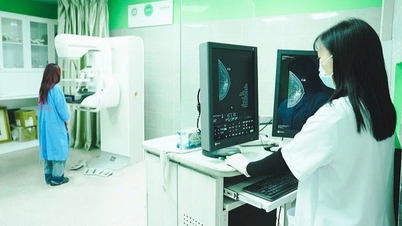


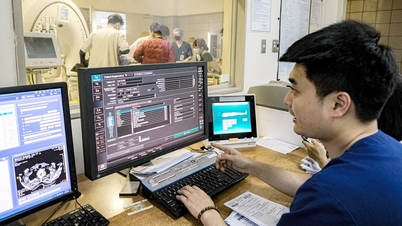



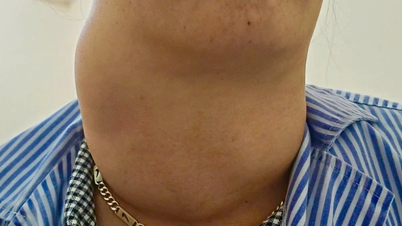
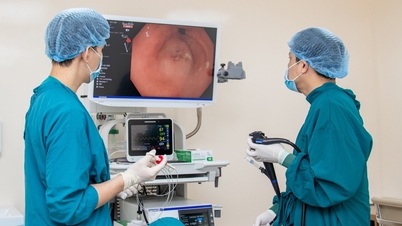










![[Photo] Bustling Mid-Autumn Festival at the Museum of Ethnology](https://vphoto.vietnam.vn/thumb/1200x675/vietnam/resource/IMAGE/2025/10/4/da8d5927734d4ca58e3eced14bc435a3)























![[VIDEO] Summary of Petrovietnam's 50th Anniversary Ceremony](https://vphoto.vietnam.vn/thumb/402x226/vietnam/resource/IMAGE/2025/10/4/abe133bdb8114793a16d4fe3e5bd0f12)

![[VIDEO] GENERAL SECRETARY TO LAM AWARDS PETROVIETNAM 8 GOLDEN WORDS: "PIONEER - EXCELLENT - SUSTAINABLE - GLOBAL"](https://vphoto.vietnam.vn/thumb/402x226/vietnam/resource/IMAGE/2025/7/23/c2fdb48863e846cfa9fb8e6ea9cf44e7)


















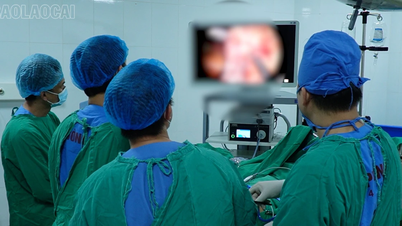

















Comment (0)